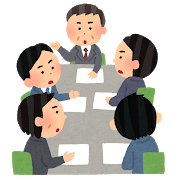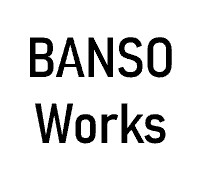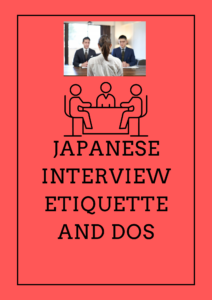What is Japanese meeting etiquette and dos / don'ts?

Japan is a country known for its rich cultural heritage and unique working customs like Kaizen(改善)and Aunno-Kokyu(阿吽の呼吸). Japanese society places a high value on social harmony and respect for others, which is reflected in the way business meetings are conducted.
Here I will introduce Japanese meeting etiquette and dos / don`ts , which is an essential aspect of doing business in Japan.
Japanese meeting etiquette and dos / don`ts

- Punctuality(時間厳守) is key
- Proper Greetings (あいさつ)are key
- Business Card Exchange(名刺交換) is key
- Speaking
- Listening(傾聴)
- Follow-up(お礼メール)
- Non-verbal Communication(あうんの呼吸)
- Online meeting rules(added in 2023)
Punctuality is key

In Japan, being on time for a meeting is critical even at online meeting. Arriving late may be seen as disrespectful and shows a lack of consideration for others. It's essential to arrive a few minutes early to show that you're organized and ready to start the meeting on time.
Proper Greetings

In Japan, greetings are essential, and it's customary to greet everyone in the room individually. It's best to bow slightly and greet people using their titles or last names with "san"(さん). If you're not sure about someone's title like Manager(課長) or name, it's better to ask beforehand.
Business Card Exchange

Exchanging business cards(名刺交換) is a common practice in Japan. When presenting your card, it's essential to hold it with both hands and present it with the Japanese side facing up. Receive the other person's card with both hands and take a moment to study it before putting it away. It's also important to show respect by using their title or name when addressing them.
It is good idea to confirm the name like" Tanaka san de yoroshiidesuka?"("To call takana is OK?").
Speaking

When speaking in a Japanese business meeting, it's essential to be respectful and avoid interrupting others. It's also crucial to speak clearly and concisely, using simple language and avoiding slang or technical jargon. Remember, again, speech should be done one by one and do not interrupt them.
Listening

In Japanese meetings, listening is just as important as speaking. It's essential to pay attention to what others are saying, and show your interest and engagement by nodding and making appropriate facial expressions.
Non-verbal Communication

In Japanese culture, non-verbal communication is essential, and people often pay attention to subtle cues such as facial expressions, posture, and gestures. It's important to be aware of your non-verbal communication and make sure that you're sending the right message.
Follow-up

After the meeting, it's common to send a thank-you note or email to express your gratitude and reiterate any important points that were discussed. It's also essential to follow up on any action items that were assigned to you and make sure that you meet any deadlines.
Online Meeting Rule (added in 2023)

In this era, online meeting is common in Japan. Remember, it is better to wait customer to leave online tool (like Zoom or Teams online) and then you should leave. If you leave first, it may be regarded as impolite in Japan.
In conclusion

Japanese meeting etiquette is an important aspect of doing business in Japan. By following these guidelines, you can show respect for the culture and customs of Japan,and build strong relationships with your Japanese colleagues and partners. Remember, being polite, respectful, and considerate is key to successful business dealings in Japan.


